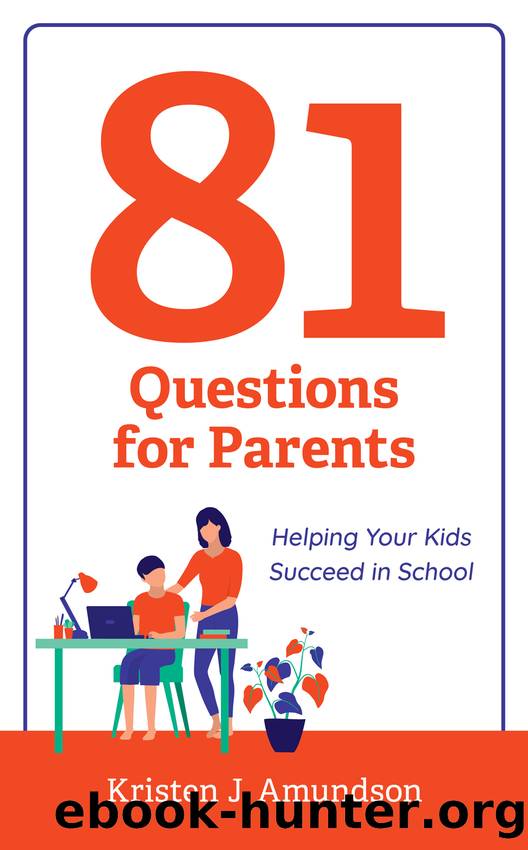81 Questions for Parents by Kristen J. Amundson

Author:Kristen J. Amundson
Language: eng
Format: epub
Publisher: Rowman & Littlefield Publishers
Published: 2021-03-05T00:00:00+00:00
37. MY MIDDLE SCHOOLER STRUGGLES WHEN READING TEXTBOOKS IN SUBJECTS LIKE HISTORY OR SCIENCE. WHY IS IT SO HARD FOR TEENS TO READ AND REMEMBER?
For a long time, we thought that learning to read was like getting a permanent toothâyou did it once and it was done. But we now know that even students who are good readers may not know how to read their science, math, or history texts. A position statement by the National Council of Teachers of English explained it this way: âReading is not a technical skill acquired once and for all in the primary grades, but rather a developmental process throughout the readerâs life.â7
Reading what is known as informational textâincluding textbooksâis a real challenge. It requires skills that are different from reading a newspaper, a magazine story, or a novel. If you read a math book the same way you read a novel, you are not likely to learn everything you need to. And the skills and strategies that work for reading science are not the same as those needed for reading history or math. So in addition to learning the content in each of these subjects, students need to learn the best way to read for meaning in each discipline.
And while most middle and high school teachers are experts on topics like Reconstruction or the linear functions, they do not always have a lot of training in how to teach reading. So their students are often left to figure things out for themselves.
Here are some suggestions that will give middle and high school students a head start as they tackle challenging texts:
â¢Donât go into a reading assignment cold. Preview the reading assignment by looking it over first. Identify key ideas. Look at pictures and read the caption. In history books, some of the most important information can be presented through photos and captions. In science books, charts may contain vital information. Read chapter headings and words in bold type. They offer an idea of what the chapter is about.
â¢Think about everything they already know about the topic. Perhaps they havenât studied the Battle of Gettysburg, but they have already learned about the Civil War. What was happening in July of 1863? That will help them get prepared for new text.
â¢Write some questions that may be answered in the reading assignment. If they have trouble thinking of questions, turn to the end of the chapter and see if there are review questions.
â¢Identify a knowledge goal for the reading. âBy the time I finish this chapter, I will know more about how scientists use the scientific method to test a hypothesis.â
â¢Learn the vocabulary. Each subject your teen studies in school has its own vocabulary. Words often have a specialized meaning in a particular discipline.
â¢Read everything on the page. In science, the symbols and diagrams are at least as important as the words. In a history book, a chart may tell an important story. As your teen finds answers to questions, check them off their list. If he has not found answers to all his questions, go back to reread.
Download
This site does not store any files on its server. We only index and link to content provided by other sites. Please contact the content providers to delete copyright contents if any and email us, we'll remove relevant links or contents immediately.
Spare by Prince Harry The Duke of Sussex(5166)
Navigation and Map Reading by K Andrew(5142)
Tuesdays with Morrie by Mitch Albom(4753)
Machine Learning at Scale with H2O by Gregory Keys | David Whiting(4281)
Cracking the GRE Premium Edition with 6 Practice Tests, 2015 (Graduate School Test Preparation) by Princeton Review(4263)
Never by Ken Follett(3918)
Goodbye Paradise(3790)
What It Really Takes to Get Into Ivy League and Other Highly Selective Colleges by Hughes Chuck(3727)
Fairy Tale by Stephen King(3353)
Harry Potter and the Prisoner of Azkaban (Book 3) by J. K. Rowling(3337)
Pledged by Alexandra Robbins(3166)
Kick Ass in College: Highest Rated "How to Study in College" Book | 77 Ninja Study Skills Tips and Career Strategies | Motivational for College Students: A Guerrilla Guide to College Success by Fox Gunnar(3106)
Reminders of Him: A Novel by Colleen Hoover(3062)
A Dictionary of Sociology by Unknown(3057)
Sapiens and Homo Deus by Yuval Noah Harari(3051)
The Social Psychology of Inequality by Unknown(3009)
Graduate Admissions Essays, Fourth Edition: Write Your Way into the Graduate School of Your Choice (Graduate Admissions Essays: Write Your Way Into the) by Asher Donald(2897)
Will by Will Smith(2891)
Zero to Make by David Lang(2769)
